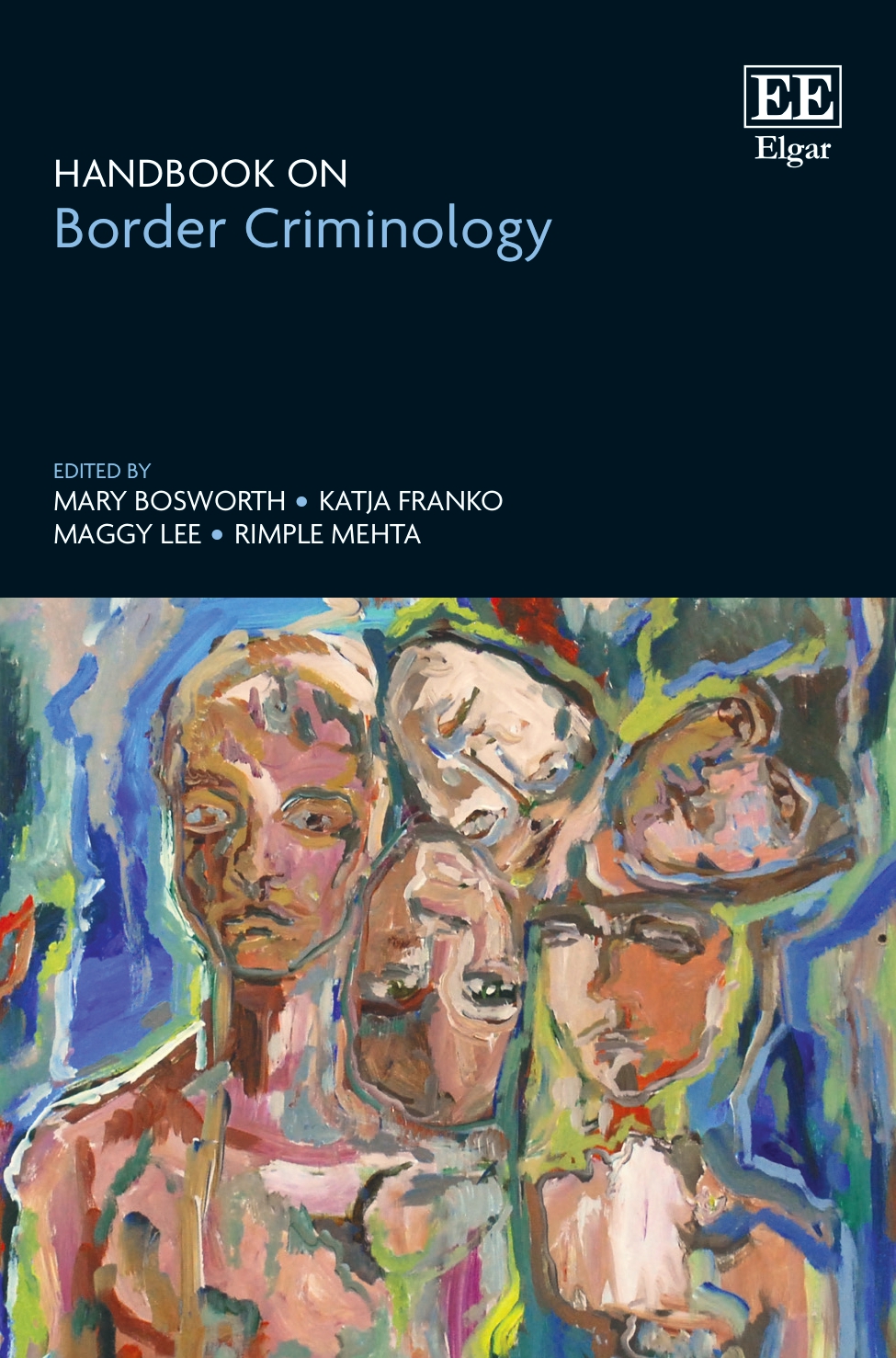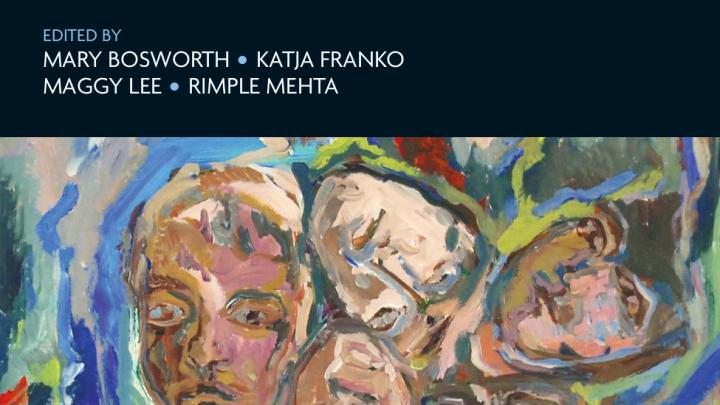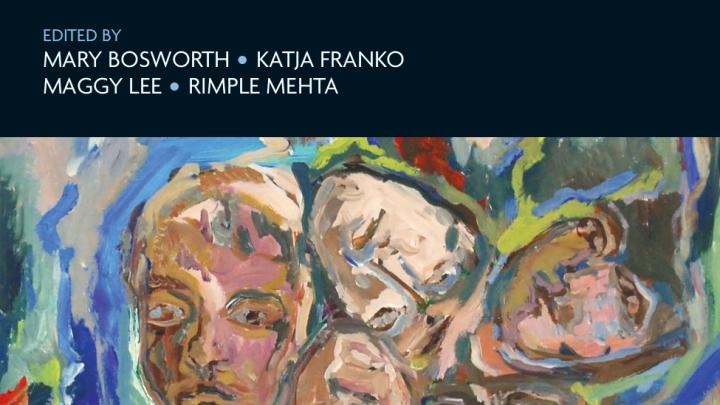Radical Recognition: A Relational Theory of Justice for Border Criminology
Posted
Time to read
Guest post by Vanessa Barker. Vanessa is Professor of Sociology at Stockholm University and writes about borders, violence, democracy, nationalism and legal mobilisations.
This is the final post from a series that summarises individual chapters from Handbook on Border Criminology, edited by Mary Bosworth, Katja Franko, Maggy Lee and Rimple Mehta and published by Edward Algar.
 People cross borders every day. Some are locked up for it and many die trying. People on the move, those seeking a better life, fleeing persecution, war, environmental disasters, or rape, make up about 3% of the world’s population. As they seek safety and security, they are often met with walls of violence and other practices and views inconsistent with the principles of international human rights and democratic norms. Reliance on violent borders is fast becoming normalized across a range of affluent western societies even as this policy preference undermines the very values and ways of life the borders are meant to preserve. How and why has this happened? Is it justifiable?
People cross borders every day. Some are locked up for it and many die trying. People on the move, those seeking a better life, fleeing persecution, war, environmental disasters, or rape, make up about 3% of the world’s population. As they seek safety and security, they are often met with walls of violence and other practices and views inconsistent with the principles of international human rights and democratic norms. Reliance on violent borders is fast becoming normalized across a range of affluent western societies even as this policy preference undermines the very values and ways of life the borders are meant to preserve. How and why has this happened? Is it justifiable?
Over the past ten years, scholars in Border Criminologies have developed an extensive and international research network to explain these developments. Researchers, people on the move, activists and civil society organizations have been at the forefront identifying, documenting, and explaining how such heavy and violent reliance on border control would not have been possible without criminalization. The racialized figure of the migrant has become nearly synonymous with criminal threat, subject to policing, surveillance, detention, deportation, and penal measures and often without the legal protections within criminal justice. The criminalization of migration is then used to justify the violence, lending it a degree of legitimacy where it should have none.
The question at hand is what should we do with our collective knowledge? For some researchers, questions of how normative beliefs and values shape, inform or result from their work, are outside the bounds of their scholarship. They may be driven by sets of empirical puzzles, paradoxes, or theoretical dilemmas they pursue over an entire career, trying to unravel them as they provide partial answers and build new knowledge along the way. This is one promise of academic freedom—to be free to ask and answer all kinds of questions, large and small, without restraint and without interference, and to follow those insights wherever they go. This is absolutely vital to the creation of new knowledge and autonomy of scholars and universities. However, the development of normative principles is not mutually exclusive from academic freedom, itself a normative claim about public goods.
For those of us concerned with the increasing criminalization of borders and asylum, I suggest two possible ways to deal with these dilemmas, one is practical, the other principled. For practical purposes, a more open dialogue, including public forums, workshops, publishing options, and a blog series about the moral or ethical positions embedded in the research findings would go a long way to clarifying, owning, and justifying these positions. Many researchers are already engaged in this kind of dialogue but the suggestion here is to create a specific forum, if not, criteria to develop these claims and arguments within the field that can be mobilized externally.
The second suggestion is more fraught, and entails developing a normative framework itself and advocating for it. Below I sketch what I have learned from border criminology to highlight key moral principles within this field and their implications. I do this in the spirit of openness rather than righteousness, but also out of a sense of urgency about the current state of our societies.
Criminological studies of border control, such as those in the Handbook, can better inform the public about the sheer scale of violence that is degrading democratic societies, and it has the potential to contribute to a cultural shift in the values that underpin it. Violence is the degradation of human life. Border Criminologies, as a web-based, non-hierarchical international network, is more in line with the rich past and present of nonviolence, civil disobedience, and collective resistance, based on moral protest around the sanctity of human life and the preservation of individual autonomy. We know from the long history of social movements, nonviolence has led to radical social change even when all seems lost. Peace and justice may sound old-fashioned but they are worth fighting for, especially in the face of state violence, the growing normalization of political violence, and a fragile moral order vulnerable to strongmen and their anti-democratic means and motives.
A theory of justice for people on the move is based on three pillars: (1) Radical recognition or respect for persons; (2) the Principle of nonviolence; and (3) Civic engagement. These three principles reflect a moral impetus to uphold the sanctity of human life and the recognition of the autonomy and equality of others. These core values emerge out of research, the field’s theoretical foundations, and collaborations with civil society and stakeholders. These pillars can be directly applied to noncitizens, people who cross borders and who are outside of conventional or closed political communities and they are based directly on social science research. These pillars can take varying forms and emphasis in different contexts but share an underlying logic of recognition, that is, the basic social need to see and to be seen by others. Radical recognition rejects all forms of domination and violence; do no harm.
While this terminology is familiar to border criminologists, what I want to emphasize is the relational aspect of respect. It is only through our social relations that we can achieve justice. A relational understanding of respect for persons avoids reducing autonomy to crass individualism or the indulgences of self-fulfillment at any cost. It is about recognizing the autonomy of other people to live without harm or coercion.
To develop this conceptual distinction, I turn to Sweden, not to rehash Scandinavian exceptionalism but rather to highlight the other side of Sweden’s cracked foundation: the recognition and respect for individual autonomy and equality. Even if they have never been fully realized, the potential is there. Respect for persons is implicit in the Swedish theory of love that posits individual autonomy as the ultimate organizing principle of the welfare state. The respect for another’s autonomy is embodied in daily encounters and face-to-face meetings. In Swedish, the term, möte mellan manniska, translated literally as a meeting between people, has a much more profound meaning: to see and be seen by another in a social exchange. To recognise and be recognised.
The concept of recognition as foundational to social life has been central to sociological theory. Defined as a social act of “affirmation,” recognition is the affirmation or acknowledgement of an individual or group’s value by others. The term captures the sense of belonging and inclusion in society, while recognition gaps contribute to exclusion and inequality, with misrecognition in particular bringing about negative impacts on life chances and well-being.
Border criminologists can take a more radical view of recognition as embodied in the Swedish möte mellan manniska meeting of persons as persons. This is a social act and a social relation that does not depend on membership. One of the most important insights across scholarship in border criminology is how categorization processes, including citizenship regimes, migration policies, national state borders, even democracies themselves, no matter how inclusive, are nevertheless exclusionary. Membership is a boundary making process that is backed by force, ranging from social norms to more formal violence intrinsic to criminal justice. Even the most expansive membership regime that strives to treat everyone equally may still pose problems for anyone on the outside. For border criminologists, respect for persons, a meeting between people, to meet person to person, has more emancipatory potential than recognition of membership. Respect can connect persons outside their social parameters of citizenship, national origin, and territorial boundaries. No one needs to be affirmed as a worthy member.
These meetings between people, face-to-face encounters and exchanges, express the most basic human connection based on respect for persons. Their ordinariness can render their power invisible but I think it is their ordinariness that makes them liberating. This is a social practice that is available to us all. At its most powerful, respect for persons can challenge the authority of the state itself, break through social hierarchies, and undermine the status quo. Historically, it has supported abolition. In these encounters, it is individuals or civil society that claim the ultimate responsibility for recognition, who to acknowledge, who to see as a person, to respect their autonomy, regardless of citizenship, migration status, religion, ethnicity or other social and national borders. We are people before we are citizens.
How to cite this blog post (Harvard style):
V. Barker. (2024) Radical Recognition: A Relational Theory of Justice for Border Criminology. Available at:https://blogs.law.ox.ac.uk/border-criminologies-blog/blog-post/2024/12/radical-recognition-relational-theory-justice-border. Accessed on: 20/12/2024Share
YOU MAY ALSO BE INTERESTED IN
With the support of












